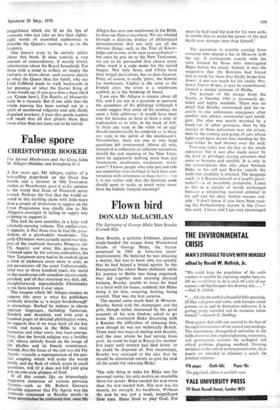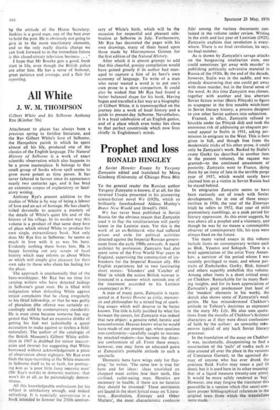Flown bird
DONALD McLACHLAN
The Springing of George Blake Sean Bourke (Cassell 42s) Sean Bourke, a quixotic Irishman, planned single-handed the escape from Wormwood Scrubs of George Blake, the traitor sentenced in 1961 to forty-two years' imprisonment. He believed he was releasing a martyr, but was to learn only too quickly that he had helped a brutal egotist. In the Hampstead flat where Blake sheltered, while his journey to Berlin was being organised, they did together each morning physical training. Bourke, unable to force his head to a level with his knees, suddenly felt Blake doing it for him, swearing, hurting, losing control. That was the first surprise.
The second came much later in Moscow. Bourke, bored with the champagne and the girls, though rather impressed by the good manners of his KGB shadow, asked to go home. He overheard Blake discussing with a Russian the difficulties of releasing him, even though he was not technically British. There were two ways of dealing with Bourke, said the man whom he had sprung from gaol: he could be kept in Russia for another five years until interest had died down; or he could be disposed of. Not surprisingly, Bourke was outraged at the idea that he should be eliminated merely to give the KGB all the credit for releasing Blake:
`The only thing at stake for Blake was his personal vanity, his only motive an insatiable thirst for power. Blake needed the KGB more than the KGB needed him. The KGB was his muscle, his strength, his backbone. Without the KGB he was just a weak, insignificant little man. Blake liked to play God. For years he had used the KGB for his own ends, to enable him to wield the power of life and death over stronger men than himself.'
The quotation is notable coming from someone who shared a flat in Moscow with the spy. It corresponds exactly with the view formed by those who interrogated Blake before his arrest. Indeed, it was the suggestion that the Russians had forced him to work for them that finally broke him down : it was too much for his vanity. Pro- fessor Trevor-Roper, it may be remembered, formed a similar estimate of Philby.
The account of the escape from the Scrubs in October 1966 is immensely de- tailed and highly readable. There was no detail that Bourke overlooked and his re- action to one unforeseen emergency after another was always resourceful and intelli- gent. The plan was nearly wrecked by a break-out of other prisoners, then by the murder of three policemen near the prison, then by the coming and going of cars whose lights must have shown him standing by the rope-ladder he had thrown over the wall.
Two-way radio was the key to the whole operation; but it was also made easier by the kind of privileges among prisoners that seem so humane and sensible. It is only in the conversations that take place between Blake in his cell and Bourke outside the walls that credulity is strained. The language used—is it Bourke himself or Cassell's ghost- writer?—is of incredible pomposity. Listen to this as a sample of words exchanged between a whispering, worried criminal in his cell and his alert, furtive rescuer out- side: `I don't know if you have been read- ing the Parliamentary reports in the Times this week. I have, and I am very encouraged by the attitude of the Home Secretary. Jenkins is a good man, one of the best ever to hold the post. He is obviously not going to give in to the more reactionary elements, and so the only really drastic change we can look forward to in the immediate future is this closed-circuit television business . . . '
I hope that Mr Bourke gets a good, fresh start in life, even though the British police are after him. He has a sense of humour, great patience and courage, and a flair for reporting.



































 Previous page
Previous page